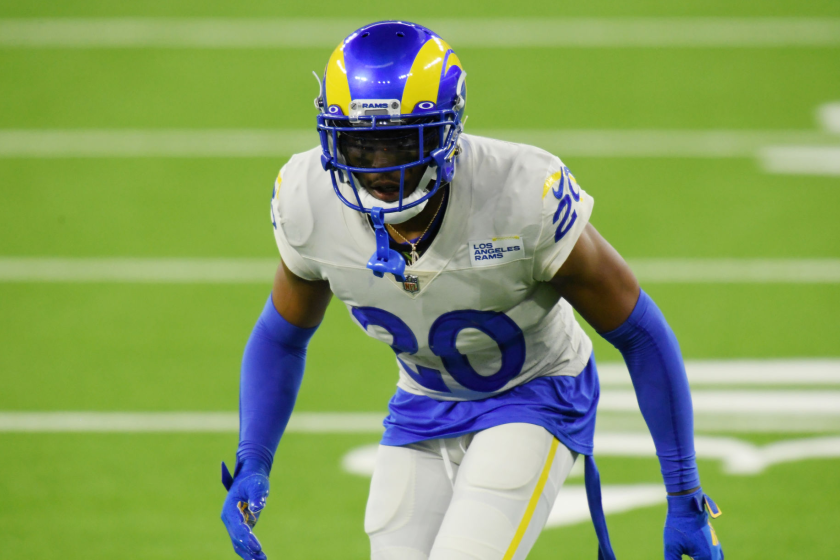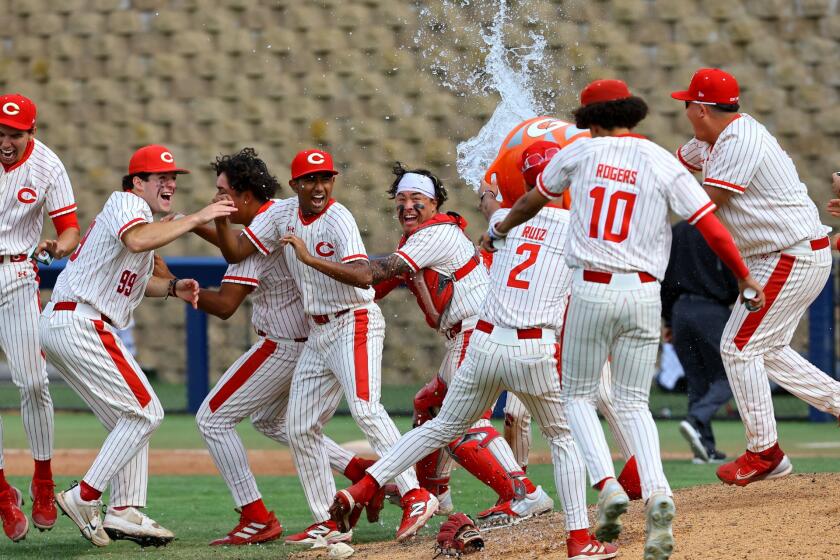Season on the Brink : For Tom Lasorda, the Pain of His Only Son’s Death Won’t Let Go
- Share via
During what he says may be the most difficult summer of his life, Tom Lasorda reveals his pain only in glimpses.
It is mid-March in Vero Beach, Fla. Lasorda is sitting in his Dodgertown office. He has just hung up the telephone, carefully laying down the receiver, then staring at it.
More bad news from home. More news that he cannot bear to discuss.
“I feel so much, but I can’t say anything about it,” Lasorda mumbles, rubbing his reddened eyes. “Would me talking about my problems do my family any good? Would it heal my son?”
The phone rings again. He picks it up and brightens. The call is about baseball.
It is midsummer in a clubhouse in Cincinnati. Lasorda is absently flipping through his frayed black phone directory. He spots a name that makes him suddenly put down the book.
“Look at this, ‘Spunky Lasorda,’ ” Lasorda says with a thickness in his throat. “His phone number is right here. I remember when we used to call. . . . “
His voice grows soft. Then he changes the subject.
It is last Sunday at Dodger Stadium. The game, a Dodger defeat, has long since ended. A limousine pulls up outside, waiting to take Lasorda and a friend to the friend’s wedding.
But at the last minute, Lasorda decides he cannot go. Something happened during the game that made him decide he should go home.
“I talked to my wife Jo on the telephone a couple of times, and she had been crying all day,” Lasorda explained later. “Sunday was the day Spunky would always come over. Sunday was the day . . . well, I just felt I had to go right home and be with Jo.”
The next night Lasorda had returned to his blustery self, jumping onto the field in the 10th inning of a game against the San Diego Padres to lead the crowd in cheers.
And so this is how one man manages a first-place team while mourning the loss of his only son.
Thomas C. Lasorda Jr., known to his friends as “Spunky,” died June 3, at 33, of pneumonia and severe dehydration.
Since then, while helping his Dodgers realize what is necessary for a championship, Lasorda has struggled privately for a different sort of understanding.
“I never thought this would happen to me,” Lasorda said quietly. “I never thought I would lose my son. Never.”
Many believe the way he has maintained his positive demeanor in the clubhouse and sixth sense in the dugout have turned this season into one of his greatest in 15 years as Dodger manager.
Lasorda said he will be happy enough when he no longer has the urge to cry every time the national anthem is played.
“I don’t know how he deals with all it. You would think something has to give,” said Mark Cresse, Dodger bullpen coach. “But Tommy keeps handling it.”
Said his wife, Jo: “I’ve been married to him more than 40 years, and he still amazes me.”
Publicly, Lasorda attacks his grief much like he used to attack opponents when he was a wild left-handed pitcher.
After mellowing for a couple of years, suddenly he is hollering more. He still doesn’t stay angry for more than about 30 seconds, but he yells louder at defeats and umpiring he thinks is poor.
He has been ejected from three times as many games, three, as last year. And his postgame tirades, directed to no one in particular, have startled even Dodger veterans.
At Atlanta earlier this season, after Gary Carter had caught a first-game loss in a doubleheader, he offered to play the second game because Mike Scioscia was injured.
“I went in to see Tommy, and he bit my head off,” Carter said. “I said, ‘What did I do?’ Then I realized he wasn’t yelling at me, he was yelling at everything. And a couple minutes later, I was told I was in the lineup.”
Bill Russell, a coach who has spent 25 years listening to Lasorda yell, figures that is one reason he has stayed healthy.
“Like Tommy says . . . he doesn’t get ulcers, he gives them,” Russell said. “By blowing off steam, he gets rid of all those frustrations.”
What has not been so easily accepted by his colleagues is his increased exercise routine.
With daily swimming and walking and pitching early batting practice, Lasorda has adopted a frenetic pace for a man who will turn 64 in September.
“Working out takes some of the sadness out of me,” Lasorda said.
Lasorda swims so much--he will do 101 laps on his birthday--that his dark swim suit has been turned white by chlorine. He takes a shower before games, so his hair won’t turn green.
And Lasorda throws so much early batting practice that Dave Hansen, a Dodger reserve, has faced him more than he has faced any other pitcher this season.
On a recent trip to New York, Lasorda was throwing early batting practice in 95-degree heat and 100% humidity. A couple of paramedics were watching him from the press box, shaking their heads.
“What is that guy doing?” one asked.
“Was it hot out there?” Lasorda said later. “Didn’t seem hot to me.”
Before this season, Lasorda had not pitched early batting practice regularly since Dodger press box scout Don McMahon died after throwing batting practice in 1987.
“I do worry about the batting practice, but having been around Tommy so long, I know that when you tell him no, that’s when he does something harder,” trainer Bill Buhler said.
Buhler uses tricks to make things easier for Lasorda during his 20-minute throwing sessions.
“I make it a point to walk to the mound to give him some water, just to break up his routine and slow him down a little bit,” Buhler said. “It’s the only way to get him to back off.”
Peter O’Malley, the Dodgers’ owner, isn’t so subtle. When Lasorda injured a hamstring while pitching to minor leaguers in Vero Beach during an evening intrasquad game last spring, O’Malley abruptly shut off the Holman Stadium lights so Lasorda would leave the mound.
“But only after my team had taken the lead,” Lasorda said.
Lasorda does not drink or smoke and has no physical problems except for a deteriorated left knee, which is the reason he began swimming.
“When your life is over, you can’t come back after a week when you’ve had enough rest,” Lasorda said. “You’ve got to live for now. And I’m in good shape for an old man.”
Said Cresse: “I try to remind him of his age. And he tells me to stick it.”
When Lasorda leaves Dodger Stadium, he deals with his stress in other ways. Often after a loss, he can be found in his Fullerton home. He sits or lies on his couch in front of his big-screen TV until 3 or 4 a.m., watching old movies and drinking tea.
“I saw ‘Oklahoma’ the other night,” Lasorda said. “It was beautiful. Sitting in front of that screen is just my way of unwinding.”
The way it has worked this season, when the movie ends, Lasorda falls asleep for a couple of hours, then soon is back at Dodger Stadium, yelling and joking. Until the next flash.
“Every time I think about my son, I just get very, very sad,” Lasorda said. “But you know something? If God said he would give me a son and then take him away after 32 years, I would say, ‘Damn right. I’ll take him.’ I’m glad for the time we had together.”
On the day that time ended, Lasorda had his suitcase packed and was preparing to drive to the airport for the start of a Dodger trip.
“But my daughter said to me, ‘Daddy, don’t go,’ ” Lasorda recalled. “Somehow, she knew. So I stayed.”
Lasorda rejoined the Dodgers three days later in St. Louis. According to Jo, it was the best place for her husband to be.
“What has saved Tommy through all this is his tunnel vision,” she said. “He is able to find something and put all of his attention to it and not think about anything else at the moment.
“That’s why it was best for him to get back with the team. There wasn’t anything else he could do at home; it was very hard for him to stay here. He could get back and get on with that part of his life.”
Jo said her husband dealt with their son’s long illness in the same way.
“I was in there with our son night and day, while Tommy would come and go,” she said. “It was best that way, because it is so hard to watch someone who is sick. Tommy couldn’t motivate him back to health. All he could do was sit and hold his hand. And that is so hard.”
She added, “Like everyone, Tommy grieves in his own way, his own place, his own time.”
And so Lasorda leads his Dodgers into an autumn filled with championship hopes. He continues to make the right moves, and say the right things, and keep a group of millionaires working together long enough to win a few baseball games.
Although it is never as easy as it looks, it has perhaps never been harder than now.
“No matter how dejected, depressed or tired I might be, my team will not see it,” Lasorda said softly. “They cannot see it. Remember, I am their leader.”
More to Read
Go beyond the scoreboard
Get the latest on L.A.'s teams in the daily Sports Report newsletter.
You may occasionally receive promotional content from the Los Angeles Times.











